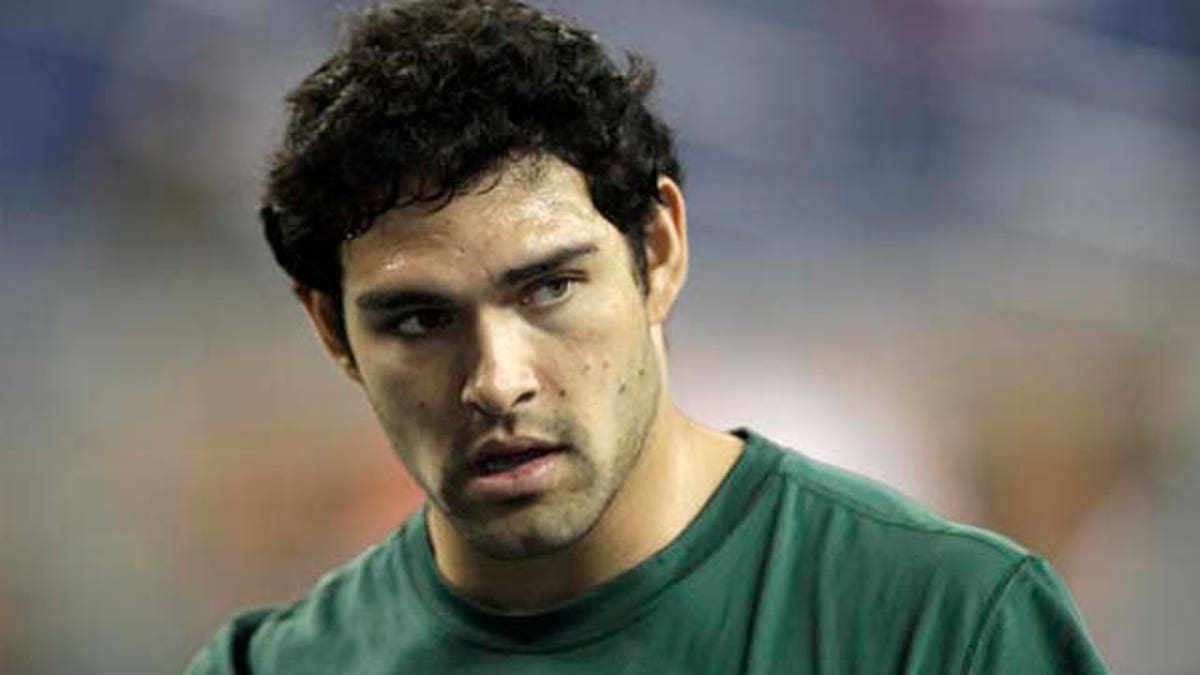
New York Jets quarterback Mark Sanchez is shown during pregame warmups against the Detroit Lions in their NFL football game in Detroit Sunday, Nov. 7, 2010. (AP Photo/Paul Sancya)
Certain phrases in life should raise a red flag.
“It’s legal” is one of them. Rarely does anything good come from a situation that needs to be prefaced with these words.
Jets quarterback Mark Sánchez has found himself at the center of controversy this week after sports website Deadspin released a story detailing his alleged relationship with a 17-year-old girl. The age of consent in New York is 17.
The piece smacks of tabloid elements, but – punctuated by pictures of what appears to be Sánchez’s bedroom, complete with a shot of rumpled bedding – it also comes across as believable.
Sánchez, 24, has yet to comment.
No laws were broken, but what might be legally acceptable doesn’t necessarily protect one in the court of public opinion.
Whether the public should get caught up in a tabloid story about what may or may not have happened between two consenting individuals, the fact is, sensationalism is an inevitable part of the era we live in.
In the grand scheme of things, a seven-year age difference isn’t much. One could point to numerous high-profile couples with an age gap twice that. Still, it’s hard to reconcile a relationship between a superstar pro quarterback and a 17-year-old girl.
The disconnect is illustrated when the girl recounts how Sánchez texted her about getting together, but she couldn’t because she had to be at high school in the morning.
Even though she’s only a couple of months away from being 18, the story is slightly unsettling because this relationship technically isn’t between “consenting adults.”
That the relationship would be illegal in 12 states certainly doesn’t help public perception.
And for a superstar athlete in the nation’s largest media market, perception is an overwhelming part of the persona. While some athletes have vented over the years about being held to higher standards, such expectations go hand in hand with accepting multimillion-dollar salaries and lucrative endorsement offers.
Sánchez, who made a name for himself surrounded by the media circus that comes with being quarterback at the University of Southern California, seemed to understand this dynamic.
He was accused of sexual assault his freshman year in college. Charges were never filed, but Sánchez referred to the ordeal as a learning experience. He has seen firsthand the importance of avoiding situations that could be perceived as questionable and the need to avoid celebrity pitfalls. Heeding those lessons becomes doubly important in the age of cell phone cameras.
The quarterback seemed to embody that approach his first two years in the NFL. He embraced his position as a role model, particularly within the Latino community. He crafted the image of a perfect pitchman – leading his team to victory on the field, keeping away from controversy off it.
In the history of notable athlete slipups, Sánchez’s current blip doesn’t even register. But thinking that this situation won’t have any sort of impact at all would be remiss.
When it comes to role model endorsers, any kind of controversy – media-driven or otherwise – can make Corporate America uneasy. Sánchez already is under a microscope playing professional football in New York City.
Now, everything will be magnified even further. His image isn’t tarnished, but the quarterback would do well to keep himself out of any kind situation where legality – or even an ethical grey area – is remotely a question.
Maria Burns Ortiz is a freelance sports journalist, chair of the National Association of Hispanic Journalists' Sports Task Force, and a regular contributor to Fox News Latino.
Follow us on twitter.com/foxnewslatino
Like us at facebook.com/foxnewslatino
